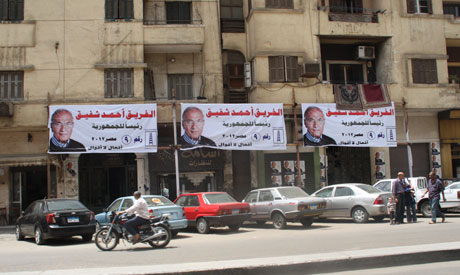 The mood on the streets of Cairo's Abbasiya district on Wednesday morning was characteristically pensive, as it has been for the past three weeks since the eruption ofbloody clashesnear defence ministry headquarters between protesters angry with the disqualification of Salafist presidential hopeful Hazem Abu-Ismail, unknown assailants and military police.
The mood on the streets of Cairo's Abbasiya district on Wednesday morning was characteristically pensive, as it has been for the past three weeks since the eruption ofbloody clashesnear defence ministry headquarters between protesters angry with the disqualification of Salafist presidential hopeful Hazem Abu-Ismail, unknown assailants and military police.
Abbasiya has been considered a hub of counter-revolutionary activity because pro-Mubarak forces had held several ralliesin the neighbourhood's main square for months after the fall of Mubarakto oppose revolutionary activities in Tahrir Square.
Thousands of people quietly marched past banners bearing candidates' images en route to their designated polling stations located in high schools which had once been palaces of Egypt's aristocracy in thepre-1952 revolution era.
There were banners for Muslim Brotherhood candidate Mohamed Mursi, renegade Brotherhood leader Abdel-Moneim Abul-Fotouh, and Nasserist candidate Hamdeen Sabbahi.
However, campaign posters for Ahmed Shafiq – Mubarak's last prime minister – were also prominently displayed at many intersections in the district that served as home to a British army base eight decades ago.
As I went to vote at my designated polling station at Al-Qobba Al-Fedawiya School next to the local police station – which had been torched by anti-regime protesters at the height of last year's uprising – people quietly discussed who they would vote for.
At a coffee shop near the station, the owner and two waiters defended their decision to hang the blue and white Shafiq posters, arguing that their preferred candidate would restore domestic security. A half dozen college students, meanwhile, muttered expletives when describing the Mubarak-era PM, telling Ahram Online that they planned to vote for pro-revolution candidates Sabbahi or Abul-Fotouh.
The presence of strong minority-anti-Shafiq sentiments in the area were felt when some of Shafiq's billboards were vandalised and destroyed outside of the legendary Al-Husseiniya Military High School on Abbasiya Street,, the neighbourhood's main avenue,in the early hours of Wednesday morning,.
AtAl-Qobba Al-FedawiyaPrimary School, hundreds of men lined up to vote at 8am. By 1pm, some still had yet to cast ballots.
The police major in charge of the station was extra polite when answering voters' questions about voting procedures and regulations – a sight unseen during Mubarak-era polls.
A sizeable number of people around the polling station confirmed to Ahram Online that they planned to vote for Shafiq as the only candidate capable of restoring law and order.
Abdel Rahman Mohamed, a 19-year-old Ain Shams University student from Abbasiya, told Ahram Online that he had voted for a revolutionary candidate – Sabbahi – in hopes of preventing the return of Mubarak associates to Egyptian political life.
Two middle-aged men who voted for Brotherhood candidates in last year's parliamentary elections said they voted for Abul-Fotouh this time around, because "we need someone who can build consensus and work constructively with the Brotherhood-led parliament."
"A secular candidate like Moussa, or a Nasserist likeSabbahi, will definitely clash with the Brotherhood," they said. "Abul-Fotouh is an Islamist; he'll know how to find common ground with the Islamist-led parliament."
Mohab, an Abbasiya resident in his early 20s, told Ahram Online that he had voted for Abul-Fotouh since "he is the candidate who brings together liberals, Islamists and leftists at a time when the country needs unity to move forward."
As men entered and exited the male-only polling station, a middle-aged woman with a young child in tow circled the station looking confused. Finally, she stopped to ask the men to assist her in finding her voter registration number via Mobinil's voter-assistance service.
"Just go in the station and ask the judge to pull it up for you from his voter list," said one of the men loitering outside the station.
Indeed, the army soldiers guarding the door to the station politely waved the woman inside.
At a coffee shop next to the Koba Al-Fedawiya polling station, a middle-aged woman named Fatma sat drinking Turkish coffee and smoking shisha in one of the neighbourhood's few women-friendly coffeehouses.
"I voted in the nearby Heliopolis district – for Sabbahi," she told Ahram Online."Most people in the line definitely did not vote for the Muslim Brotherhood's Morsi – this was obvious from the lack of beards in evidence," she said. "Some voted for Shafiq, while most others voted for Abul-Fotouh, Sabbahi or Moussa."
A taxi driver picking up fares near the polling station told Ahram Online that he had not cast a ballot since he was currently serving in the army (according to Egyptian law, military personnel are not allowed to vote in national elections).
But if he could have voted, he said, he would have done so for Shafiq, whom he views as "the only one capable of providing stability and restoring domestic security."
"Since last year's revolution, there have been fights in the streets almost every day – it's chaos," he said. "Shafiq is the only candidate who can bring things back to normal."



